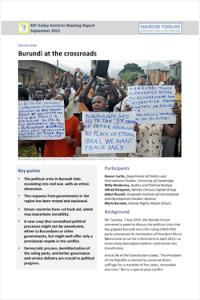Key points
• The political crisis in Burundi risks escalating into civil war, with an ethnic dimension.
• The response from governments in the region has been muted and equivocal.
• Donor countries have cut back aid, which may exacerbate instability.
• A new coup that normalized political processes might not be unwelcome, either to Burundians or other governments, but might well offer only a provisional respite in the conflict.
• Democratic process, demilitarization of the ruling party, and better governance and service delivery are crucial to political progress.
Participants
Devon Curtis, Department of Politics and International Studies, University of Cambridge
Willy Nindorera, Author and Political Analyst
Alfred Nicayenzi, African Century Capital Group
Aidan Russell, Graduate Institute of International and Development Studies, Geneva
Maria Burnett, Human Rights Watch (Chair)
Background
On Tuesday, 7 July 2015, the Nairobi Forum convened a panel to discuss the political crisis that has gripped Burundi since the ruling CNDD-FDD party announced its nomination of President Pierre Nkurunziza to run for a third term in April 2015—a move many Burundians believe contravenes the Constitution.
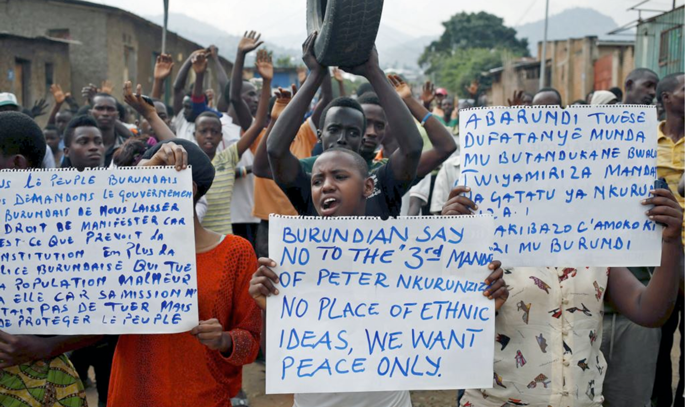
Article 96 of the Constitution states: ‘The President of the Republic is elected by universal direct suffrage for a mandate of five years, renewable one time.’ But in a special post-conflict arrangement under the Arusha Peace Process, in 2005 Nkurunziza was elected to his first term indirectly by parliament, rather than by universal suffrage. His position is that the Constitution entitled him to stand for third term, this time with universal suffrage. The opposition, members of Burundi’s civil society, and a large numbers of Burundian citizens disagreed. Prominent members of the President’s own CNDD-FDD party joined them and, by March 2015, seventeen senior party members—including the party spokesman and president’s spokesman—had publicly opposed the third term.
Nevertheless, on 25 April 2015, backed by a controversial Constitutional Court ruling, the CNDD-FDD announced Nkurunziza’s nomination to run for the presidency. Popular protests erupted. On 13 May 2015 members of the military attempted a coup; and a reactive crackdown by the police—reportedly working with the CNDD-FDD’s armed youth militia, the Imbonerakure—left scores dead. Security forces closed all the major private radio stations and conducted mass arrests of civilians, including some fifty journalists. A few Nkurunziza supporters intimated that the coup attempt and protests were Tutsi-led and supported by Rwanda, which awakened fears and traumas residual from the country’s lengthy ethnic conflict. Over one hundred thousand Burundians left the country to take refuge in Tanzania and Rwanda. Among them were prominent members of the CNDD-FDD and the military.
Risk of war and ethnic conflict
There is a real risk of war, warned Willy Nindorera. Already, some military officers and politicians—including the former President of the CNDD-FDD, the recently defected first Vice President, and the president of the national assembly—have predicted a return to armed conflict. The controversy has left the security forces divided and the CNDD-FDD purged of moderate elements by defections. The result has been a strengthening of the military wing of the party, which is taking a hardline stance that has closed the space for peaceful dialogue and political resolution. Ultimately, Nindorera contended, the crisis stems from the failed demilitarization of CNDD-FDD and the consequent failure of democratization of the party. Alfred Nyicayenzi added that the abandonment of the term limit has done serious damage to the political fabric of the country. Term limits, he said, were a cornerstone of political arrangements reached in the long and painstaking process of the Arusha Agreement. Their abandonment may be taken as the abandonment of the peace process itself and an invalidation of all the rules of peaceful engagement that process nurtured.
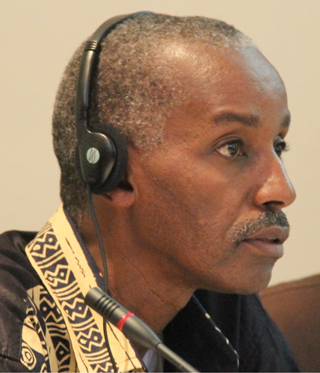
In view of the country’s tragic history, of paramount of concern is the possibility that, if war erupts, it will become ethnicized. Recently, Nindorera reported, there have been communications by certain officials that covertly encourage interpretation of the current crisis along ethnic lines. On 28 March 2015, for instance, one of the two Vice Presidents of CNDD-FDD made a speech in which he said those who oppose the third term should be treated in the same manner as those who killed Ndadaye. Burundians, knowing that a Tutsi-dominated army killed Ndadaye, understood the insinuation. Other officials have also made statements that stigmatize the Tutsi minority, which present cause for worry, taken with the fact that Rwanda is accused of being behind the rebellion.
But ethnic division is not a necessary framework for crisis in Burundi, Aidan Russell stated. The country has had political conflicts that did not unfold along ethnic lines. In addition, significant progress has been made over the past ten years to remove the issue of ethnicity from political contests, and in the current crisis the opposition alliance contains both ethnicities. He also noted, however, that it would be a mistake to be too sanguine. Historically, when ethnicity did become a political factor, it did so extremely quickly and there remains a risk that interested parties will succeed in changing the understanding of the conflict.
International response
Initial reactions from the international community, including regional governments, were strong. The President of the African Union, U.S. Senator Russ Feingold, Belgium’s Minister of Foreign Affairs, and the Security Council all joined in a chorus of censure against Nkurunziza. Regional leaders, notably Tanzania’s President Jakaya Kikwete, and other African diplomats mobilized to persuade Nkurunziza to relent. More recently, however, rebuke from regional governments has grown more muted and equivocal. In February and March 2015, when Nkurunziza traveled the region canvassing leaders in the region to support his bid for a third term, it seemed clear that none would do so. But by 30 May, when regional governments met to discuss the crisis, positions were much softer. They no longer defended term limits but argued, instead, on the basis of country’s instability and Nkurunziza’s unpopularity. Rather than admonishing Nkurunziza to step down, they recommended a postponement of elections to allow time for talks.
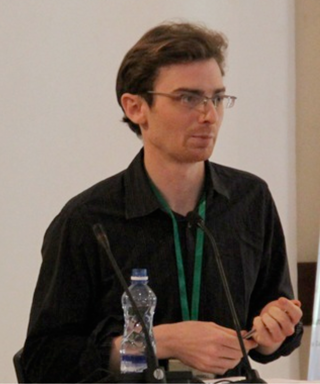 Part of this reserve may be due to the attempted coup, explained Devon Curtis, which somewhat discredited Nkurunziza’s opponents. More significantly, there has been a marked weakening of support for term limits in the region in general. It is not insignificant that a number of leaders in the region—Joseph Kabila, Yoweri Museveni and Paul Kagame—are finding their own constitutional term limits inconvenient. Regional country interests and animosities also come into play. Despite not having term limit issues itself, Tanzania softened its position after the coup attempt. Perhaps, Curtis speculated, as a result of perceptions that Rwanda—with which its relations are strained—was behind it. South Africa, which played a vital role in Burundi’s peace process, also made strong initial statements against the third term. It then demurred, possibly moved by a reluctance to stand apart from other countries while its leadership of the African Union hangs in the balance. By contrast, the African Union has maintained a strong stand in defense of the term limit. It also has the authority to penalize countries in cases of unconstitutional transfers of power, including by suspension from the Union. But it appears unlikely that it will impose any meaningful sanctions because of the position of regional governments.
Part of this reserve may be due to the attempted coup, explained Devon Curtis, which somewhat discredited Nkurunziza’s opponents. More significantly, there has been a marked weakening of support for term limits in the region in general. It is not insignificant that a number of leaders in the region—Joseph Kabila, Yoweri Museveni and Paul Kagame—are finding their own constitutional term limits inconvenient. Regional country interests and animosities also come into play. Despite not having term limit issues itself, Tanzania softened its position after the coup attempt. Perhaps, Curtis speculated, as a result of perceptions that Rwanda—with which its relations are strained—was behind it. South Africa, which played a vital role in Burundi’s peace process, also made strong initial statements against the third term. It then demurred, possibly moved by a reluctance to stand apart from other countries while its leadership of the African Union hangs in the balance. By contrast, the African Union has maintained a strong stand in defense of the term limit. It also has the authority to penalize countries in cases of unconstitutional transfers of power, including by suspension from the Union. But it appears unlikely that it will impose any meaningful sanctions because of the position of regional governments.
For now it appears that Burundi’s military supports Nkurunziza, so regional positions may also reflect a prioritization of stability over conflict, albeit imposed by force. Regional countries run high risks in the case of a war in Burundi as refugees and fighters will likely spill over their borders. These risks are particularly acute for Rwanda and the DRC. The latter has received fewer refugees than Tanzania and Rwanda, but the east of the country has yet to fully emerge from its own long war and remains highly militarized and unstable.
This is not least due to the continuing operations of the Hutu-led Democratic Forces for the Liberation of Rwanda (FDLR) in the DRC. There are, Curtis pointed out, links between the FDLR and the Imbonerakure, making it conceivable that a war in Burundi might spill over to the eastern DRC and involve the FDLR. This could in turn have serious political and security consequences for Rwanda. The CNDD-FDD was deeply entangled in the second Congo war, in alliance with Rwandan Hutu rebels against the Rwandan Patriotic Front. This involvement continued into the early 2000s, while the CNDD-FDD was under Nkurunziza’s leadership. Although, Russell added, Rwanda-Burundi relations improved after the 2005 elections, since 2010 they have been steadily deteriorating. Rwanda has accused the Imbonerakure of receiving arms from the FDLR and has made worrying statements hinting at a possible military engagement over this issue.
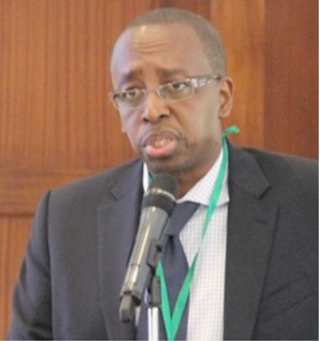 Farther afield governments have maintained a stronger position against the third term, though Burundi’s affairs are clearly not a high international priority. The European Union withdrew support for the electoral process and has threatened economic sanctions on Burundi. Several important donor countries have terminated development assistance programmes in Burundi—particularly programmes providing direct budgetary support—and there are threats of further cuts. The economic impact of this, Nicayenzi said, will be devastating. Foreign aid accounts for fifty percent of the state’s budget. Even before the current crisis the country was struggling with a weak economy, which now stands on the brink of collapse. Foreign reserves were only sufficient to cover imports for four or five weeks, rather than the optimal four to five months. With aid cuts and internal revenue dropping rapidly they will further diminish. The government’s already grave deficit in economic expertise has compounded this problem, deepened by the defection of officials from the CNDD-FDD—including officials that had some understanding of economic governance.
Farther afield governments have maintained a stronger position against the third term, though Burundi’s affairs are clearly not a high international priority. The European Union withdrew support for the electoral process and has threatened economic sanctions on Burundi. Several important donor countries have terminated development assistance programmes in Burundi—particularly programmes providing direct budgetary support—and there are threats of further cuts. The economic impact of this, Nicayenzi said, will be devastating. Foreign aid accounts for fifty percent of the state’s budget. Even before the current crisis the country was struggling with a weak economy, which now stands on the brink of collapse. Foreign reserves were only sufficient to cover imports for four or five weeks, rather than the optimal four to five months. With aid cuts and internal revenue dropping rapidly they will further diminish. The government’s already grave deficit in economic expertise has compounded this problem, deepened by the defection of officials from the CNDD-FDD—including officials that had some understanding of economic governance.
Another coup?
Not without reason, Burundians and some in the international community who are losing faith in democratic processes may be hoping that the military will step in to avert an armed conflict. Even in the post-Arusha reform state, Russell pointed out, the military remains the ultimate arbiter of political power in Burundi, where there have been more coups than elections. And the military has managed a number of non-violent coups in circumstances similar to today’s, in which officers and the urban elite share frustration and weariness with a regime that has overseen only economic stagnation and political instability. In fact, as Nindorera observed, the army did try to play a pacifying role when violence broke out in the current crisis. He also noted that the international condemnation of the attempted coup was relatively muted. It does not seem, he said, that a coup in the future would draw strong sanctions as long as it leads to a normalization of political processes.
Root problems
But even a peaceful military-managed transition will be a deferral, not resolution, of instability, Russell insisted. In all historical cases, the regimes installed in peaceful coups have proved unstable. They soon replicated the flaws of their predecessors, reverting to violence to retain power, and eventually fell in much the same manner as the regimes they replaced. These perennial upheavals, Russell argued, arise from a fundamental lack of representation in Burundian politics, which responds exclusively to elite demands. Only a process that transcends the usual alliance between military power and the urban elites and engages the large rural majority will alter the political dynamics
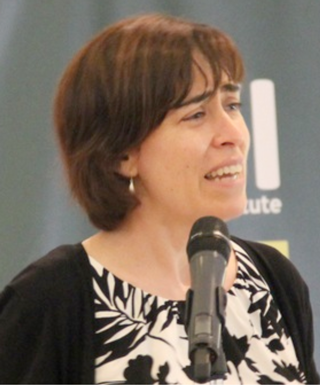 The more urgent problem in Burundi may not be one of representation, but of governance and service delivery. Nicayenzi pointed out that economic performance over the past ten years has been dismal by the CNDD-FDD’s own admission. Even before the crisis there was an urgent need to change tack. The economy was growing at a mere five percent per year. At this rate in ten years the current GDP per capita of USD 285 would only reach USD 345. Its institutional incapacity to handle economic issues—worsened by defections, poor economic performance and service delivery—will likely scuttle Nkurunziza’s government before poor representation does. Unaddressed, they will continue to do so to future governments.
The more urgent problem in Burundi may not be one of representation, but of governance and service delivery. Nicayenzi pointed out that economic performance over the past ten years has been dismal by the CNDD-FDD’s own admission. Even before the crisis there was an urgent need to change tack. The economy was growing at a mere five percent per year. At this rate in ten years the current GDP per capita of USD 285 would only reach USD 345. Its institutional incapacity to handle economic issues—worsened by defections, poor economic performance and service delivery—will likely scuttle Nkurunziza’s government before poor representation does. Unaddressed, they will continue to do so to future governments.
On the other hand, a well-governed Burundi could do very well, Nicayenzi offered. The country has many strengths. It is an old nation, enjoying attributes of nationhood the majority of countries in Africa lack. It has a strong tradition of private land ownership and property rights that could serve as a foundation for rule of law and a business-friendly regulatory regime. It is centrally located, adjacent to the commodities powerhouse that is the DRC. And there is beauty in being small. Nine out of ten of the wealthiest countries in world are small countries. It will take a lot of work, imagination and will, Nicayenzi said, but with good leadership Burundi could be an attractive and prosperous trade and service hub for the western East African Community and the eastern DRC.
Postscript
On 21 July 2015, Burundi held presidential elections, boycotted by the opposition, in which Pierre Nkurunziza won 69 percent of the votes. Violence has continued to shake the country. Human rights groups have criticized the government for mass arrests, arbitrary detentions and the deaths of dozens of civilians and some senior political and military leaders. Some two hundred thousand Burundians have now taken refuge in neighboring countries

